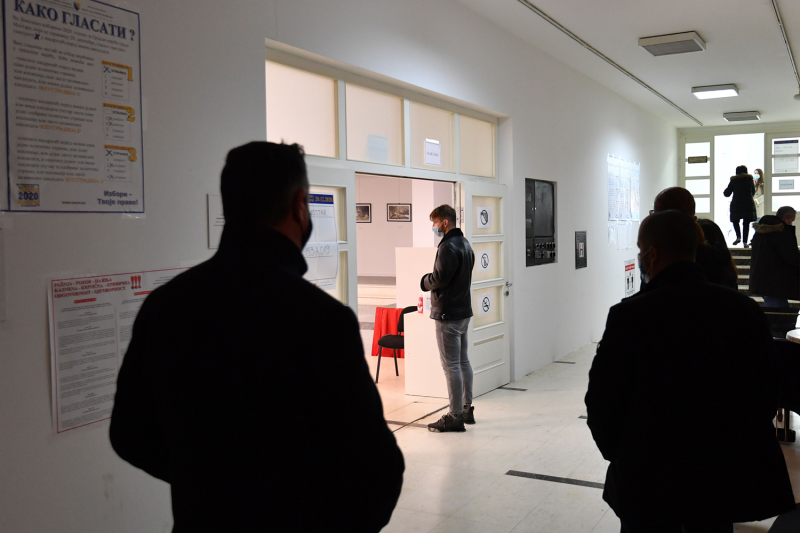U.S.-China Trade Deal Defies Expectations

U.S.-China Trade Deal Defies Expectations
But big questions remain about what happens next.
Members of the Chinese delegation are seen during talks on tariffs between U.S. and Chinese officials in Geneva on May 10. Fabrice Coffrini/AFP via Getty Images
Welcome to Foreign Policy’s China Brief.
The highlights this week: U.S.-China talks lead to a 90-day tariff rollback, Chinese-made fighter jets are tested in the India-Pakistan conflict, and an elite hospital scandal consumes the Chinese internet.
Welcome to Foreign Policy’s China Brief.
The highlights this week: U.S.-China talks lead to a 90-day tariff rollback, Chinese-made fighter jets are tested in the India-Pakistan conflict, and an elite hospital scandal consumes the Chinese internet.
Trade Talks Bear Surprising Fruit
A weekend of U.S.-China negotiations in Geneva has produced a dramatic de-escalation in trade tensions, to the relief of battered global markets. On Monday, both sides announced that they had reached an agreement for a 90-day rollback on reciprocal tariffs, bringing China’s rates on U.S. goods down to 10 percent and U.S. rates on Chinese goods to 30 percent.
It’s still unclear how long this trade cease-fire will hold and whether it’s the precursor to a more stable U.S.-China relationship or just temporary stillness in a stormy sea. The swiftness of the deal surprised many observers who expected the talks to bear little fruit, given the prickliness between both sides’ leaders and their need to maintain face.
But a surprisingly amiable atmosphere and mutual bonhomie seems to have contributed to the success and speed of the agreement. U.S. Trade Representative Jamieson Greer told a press conference that “a lot of the key negotiations happened … outside, under a large beautiful tree on a set of patio sofas.” This setting, he said, “let us develop personal relationships with our counterparts and led to the successful conclusion we had.”
The springtime weather in Switzerland may have been a factor, but perhaps so was the Chinese side’s relatively new interpersonal approach. As economist Lizzi Lee notes, Chinese officials have made a concerted effort of late to speak “like a human being.”
That has been apparent in both official communications and in the behavior of key figures such as Chinese Vice Premier He Lifeng, who Lee said has embraced a “more responsive, less scripted” tone. This has played well with the U.S. side, where hawkish figures such as White House advisor Peter Navarro seem to be sidelined for now—though in a revolving door administration such as U.S. President Donald Trump’s, you never know who will have power next week.
Many observers have instead fixated on the question of “who blinked first.” The answer for some of them—from former U.S. Treasury Secretary Larry Summers to even Fox News reporters—has been Trump. There is truth in that, given that he started the trade war, and it proved to be wildly unpopular.
China hawks who hoped for a full decoupling, meanwhile, have consoled themselves with the thought that Trump’s erratic negotiating was a successful instance of the madman theory in action.
For its part, China has framed the de-escalation as a win, with President Xi Jinping noting that “bullying and tyranny will only lead to self-isolation.” Chinese officials, however, may have been under just as much pressure from shuttered factories and terrified exporters as Trump was from declining poll numbers and his business advisors.
Ultimately, it may be better to think of this as a mutual step back from a gunfight rather than as either side blinking. But questions remain about what happens next.
Will advisors such as U.S. Treasury Secretary Scott Bessent pursue major tariff exemptions and aim to de-escalate the trade war entirely? Will Trump impose new tariffs (though perhaps with a lower ceiling) in 90 days’ time, or are markets correct in treating the pause as effectively indefinite?
For most Americans, the bigger question may be whether Chinese factories will orient themselves toward U.S. markets again. Chinese exporters still want this access and may deem 30 percent price increases to be something that consumers will stomach in full or in part, though they have already been eyeing both domestic and international markets as alternatives.
What We’re Following
India-Pakistan conflict. The brief dispute between India and Pakistan last week was a test for Chinese-made military gear, which seemingly passed with flying colors. The relationship between Beijing and Islamabad is long-standing; both sides describe it as the “iron brotherhood.”
China now supplies 81 percent of Pakistan’s military imports—a figure that has increased over the past decade, as Chinese arms manufacturing has grown and the U.S.-Pakistan relationship has deteriorated. Diplomatically, however, China did not back either side and instead joined the United States in calling for peace.
Pakistan claims that it shot down five Indian jets—including three relatively up-to-date French-made Rafales—using the Chinese-made J-10C fighter jet in its first-ever combat engagement. The J-10C manufacturer’s stock price has soared as a result. If Pakistan’s claims are true, this would not only validate the quality of Chinese-made aircraft, but also the surveillance and communication infrastructure supplied by Beijing.
India has denied Pakistan’s shootdown claims, but rumors are swirling among security and political circles in New Delhi that Pakistan’s unexpected success has sparked panic among the Indian leadership.
Putin’s parade. Xi’s visit to Russia last week proceeded largely as expected, as he and Russian President Vladimir Putin pledged national friendship once again at the Victory Day parade in Moscow. The Chinese statement on Xi’s arrival emphasized both countries’ commitment to the “U.N-centered international system”—which, for both Beijing and Moscow, implies that they, as victors in World War II, should set terms for smaller countries.
But the visit may put a spoke in the wheels of China’s attempts to get closer to Europe in shared irritation over the U.S.-led trade war. Following Xi’s trip, a European Commission spokesperson highlighted China’s role in aiding Russia’s war in Ukraine, while Kyiv condemned the visit as “support for the aggressor state.”
FP’s Most Read This Week
- A Tale of Four Fighter Jets by Rishi Iyengar
- What Is the Risk of a Conflict Spiral Between India and Pakistan? by Sumit Ganguly
- Joseph Nye Was the Champion of a World That No Longer Exists by Suzanne Nossel
Tech and Business
4+4 scandal. A dramatic hospital scandal has consumed the Chinese internet in recent weeks, sparking critiques of the benefits endowed to Chinese elites. The so-called 4+4 scandal is named for an accelerated medical school program at one of China’s top hospitals that takes just eight years of higher education—including, sometimes, just four focused on clinical medicine—rather than the more common 11 years. It is principally available to graduates of elite foreign schools.
On April 18, the estranged wife of Xiao Fei, a surgeon at Beijing’s exclusive China-Japan Friendship Hospital, posted a letter online detailing her husband’s affairs, including with a young female resident.
The hospital fired Xiao on April 27, and he was subsequently expelled from the Chinese Communist Party. But the public has directed its anger primarily at the resident, Dong Xiying, whose privileged family background and career rise through the 4+4 program was analyzed in detail.
Elite privileges are highly sensitive in China, and internet censors have been removing online references to the scandal. Still, the impact could be as dramatic as that of the Guo Meimei scandal of 2015, when a young woman flaunting her wealth became the focus for public anger about corruption in official nongovernmental organizations.
E-commerce woes. Despite the U.S.-China tariff rollbacks agreed to over the weekend, the de mimimis postal exemption for packages under $800 is still off the table. The United States has reduced the amount imposed on such packages from 120 percent to 54 percent, which is an improvement but still considerably higher than the rate on regular imports.
The de minimis exemption allowed e-commerce apps Shein and Temu to explode in popularity in the United States, and the companies are now attempting to compensate by importing larger volumes of popular products to their U.S. warehouses. But low-income consumers in particular are still reeling from the impact and looking to other Chinese apps as a temporary solution.
James Palmer is a deputy editor at Foreign Policy. X: @BeijingPalmer
More from Foreign Policy
-

Indian Air Force personnel stand in front of a Rafale fighter jet during a military aviation exhibition at the Yelahanka Air Force Station in Bengaluru. A Tale of Four Fighter Jets
The aircraft India and Pakistan use to strike each other tell a story of key geopolitical shifts.
-

A cardinal in a black robe with red sash with hands folded in front of him walks past a stage and steps. Conclave Sends Message With American Pope
Some cardinals had been agitating for U.S. leadership to counter Trump.
-

An illustration shows red tape lines crossing over and entrapping a semiconductor chip. Is It Too Late to Slow China’s AI Development?
The U.S. has been trying to keep its technological lead through export restrictions, but China is closing the gap.
-

A man watches a news program about Chinese military drills surrounding Taiwan, on a giant screen outside a shopping mall in Beijing on Oct. 14, 2024. The Pentagon Fixates on War Over Taiwan
While U.S. military leaders fret about China, Trump has dismissed the Asia-Pacific.






Join the Conversation
Commenting on this and other recent articles is just one benefit of a Foreign Policy subscription.
Already a subscriber?
.
Subscribe
Subscribe
View Comments
Join the Conversation
Join the conversation on this and other recent Foreign Policy articles when you subscribe now.
Subscribe
Subscribe
Not your account?
View Comments
Join the Conversation
Please follow our comment guidelines, stay on topic, and be civil, courteous, and respectful of others’ beliefs.
Change your username |
Log out
Change your username:
CANCEL
Confirm your username to get started.
The default username below has been generated using the first name and last initial on your FP subscriber account. Usernames may be updated at any time and must not contain inappropriate or offensive language.